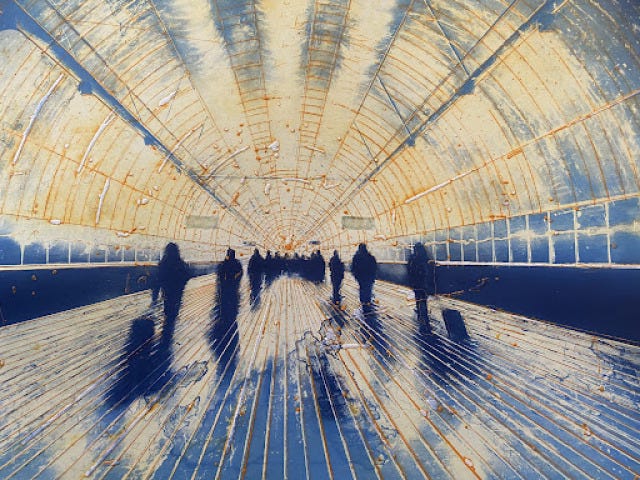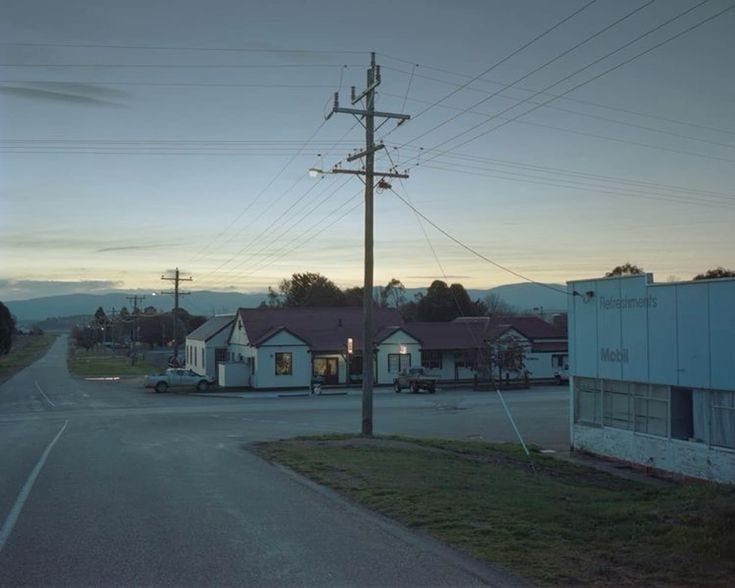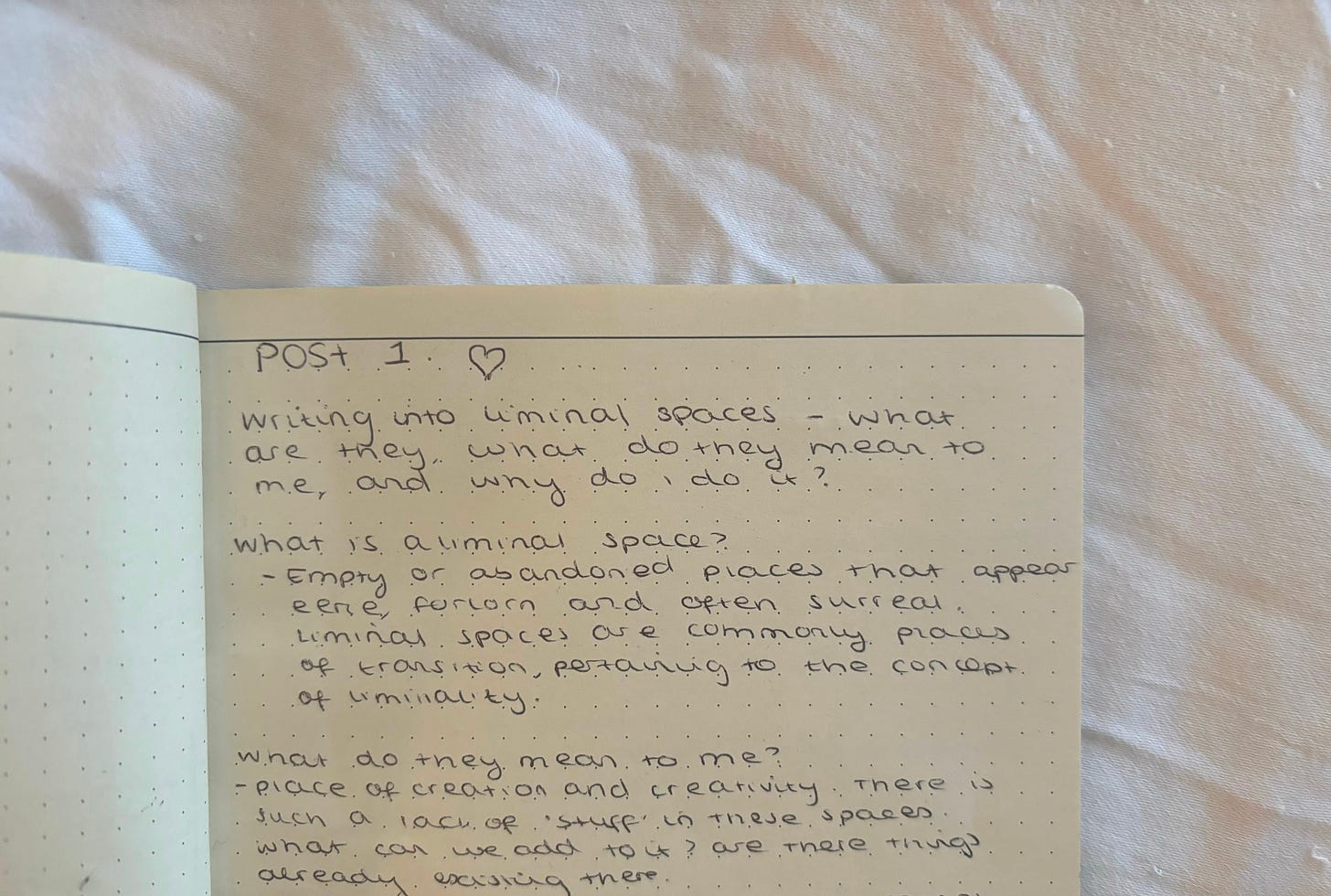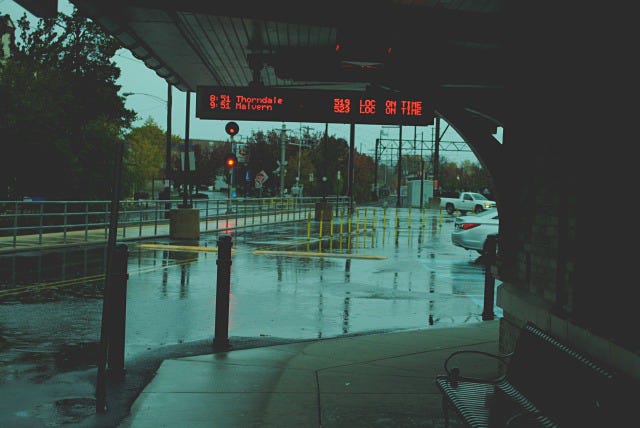Transition and Liminal Space: I am Forever Required to Move
Periods of change, the vulnerability of not knowing, what actually is a liminal space, and how can we write into the gaps that are left behind?
“Here I am, a bundle of past recollections and future dreams, knotted up in a reasonably attractive bundle of flesh. I remember what this flesh has gone through; I dream of what it may go through.”
The Unabridged Journals of Sylvia Plath by Sylvia Plath
I flew to New York in the summer of 2022- a trip I'd been looking forward to for almost two years. More so in the five months leading up to it- a mad flurry of saving, planning and pinning locations on google maps, half of which I knew I’d run out of time to ever see. The only memory I retained from the haze of excitement on the travel day was being in Heathrow airport at just past four in the morning, watching a plane take off through windows that haven’t been cleaned yet that day. There was a sense, sitting on hard plastic chairs and waiting for my gate to open, that everything in the space around me was holding its breath.
Airports, for me, have always held onto the label of a liminal space more than anything else I can think of. Of course there are others- neon signs glowing above silent petrol stations after hours of driving through the night, and when you pull over to top up the car and there’s not another living human in sight. Empty streets gone quiet just after it’s rained, and people are slowly crawling out of cafes and apartments back into the land of the living. Train stations too, because much like airports there is always somebody arriving and always somebody leaving. These spaces feel unstable in their identities. They are forever in motion, forever transitioning, forever fluid in a way that is indescribable- it can’t quite be captured in words.

So back to airports, and the idea that the people, and then the planes themselves, are constantly moving. There is a volume of motion in and out of these spaces that I can’t quite wrap my head around. I think there’s a daily average of something like 5,300 flights in the UK alone, and roughly 300 people per flight, give or take. So that’s a lot of people, a lot of lives, and a lot of stories. But somehow, the airports seem to exist outside of these overwhelming statistics.
I was twelve when, en route back from visiting family in France with my mum, our flight was cancelled. We’d sat through hours of delays, countless reassurances despite uncertainty, and eventually we were left with all local hotels closed, and a booking secured for the next flight in the morning. We ended up sleeping in the airport, which honestly is not something I’d ever recommend, but was a strangely liberating experience. After receiving strict instructions from my mother to not move, I found myself wandering through the terminal in the middle of the night. For the first time in my memory of an airport, it was quiet. The runways were still, announcements scarce if any, and the only movement was the occasional light flickering overhead. It felt like stepping into a graveyard full of living people, like witnessing a contradiction I was never supposed to see. It was the same feeling I had almost eight years later on my way to New York; like there was a collective feeling of not quite breathing. Waiting. The moment felt almost haunted by something (the ghosts of Christmas past, present and future, if you will).
Liminal spaces and all of the ideas surrounding them fascinate me. Maybe, at their core, I find them interesting because they're strange. They’re a little abnormal, and honestly, saying that does nothing except make me want to walk into them and have a good look around. They’re characterised as places of transition, of change, of existing somewhere between two states of being. I don’t know exactly where the idea to write about them came from, but experiencing them always triggers feelings of the ground shifting slightly beneath my feet. This used to scare me, but the last four years have taught me that just because I have fear around something , it doesn’t mean I have to close my mind to how it could help me. If I can figure out how to step into an empty space- emotionally speaking more than anything else- it opens me up to the possibility of change.
When I first sat down to write this piece and started brainstorming, I had a thousand ideas in my head and only a vague idea of how to connect them. I could feel the links though, simmering just under the surface and urging at me to look a bit deeper. I think writers sometimes know when they’ve got something important to say, or at least a point worth making. I had that feeling, even if I couldn’t really articulate it. My notes looked something like: What is a liminal space, how do I understand it, how does creativity link to this, how does recovery link to this, how does humanity link to this (etc, etc, etc). Lots to talk about, but there’s a part of me, as I’ve gone through this process, that has started to understand I’m really only talking about one thing.
Last week, I sat in a room of strangers and listened to someone open up about being uncomfortable. He shared about how often things that are good for us don’t tend to feel good. For me, the water-tight key to recovery is getting out of my comfort zone. I don’t like doing it, I don’t ever want to do it, and frankly I resent the idea of feeling even remotely negative, ever in my life. But again and again, I circle back around to this: I have to keep doing things I don’t find easy, or I’ll stay stuck in the same space forever. I am forever required to move.
Getting out of my comfort zone, ultimately, is what helps to expand it. I become settled in the feelings of uncomfortability, and slowly learn to live with them. I feel uncomfortably-at-home in these spaces of transition, because there can be growth in them too. I can reach back in time with this understanding, and attach it to the airport versions of myself. Somewhere, twelve year old me is wandering through Charles De Gaulle with a quiet sense of unease, goosebumps raising in the sudden silence.
A liminal space is often defined by its emptiness. We call them places of transition, but there remains an undeniably lonely feel to them too. They are spaces where people fear to tread. Think of petrol stations at night, drive thrus with no cars, hallways, airports, train station platforms in the dead of night, waiting rooms filled with people refusing to make eye contact. There is no connection; isolation within a group. I am surrounded by people, and yet right now I feel like the only person on the planet. Liminal spaces signify that there is something existing in limbo, or that there’s something in the process of moving in or out of that state. The spaces themselves embody this feeling, bringing fears of change to life as viscerally as if someone had slapped me across the face.
There is a part of me, perhaps a younger part, or an unhealed part (or more likely a very human one) that has always feared change. It often feels far easier to stay in pain, or to stay in the past and my old ways of thinking, rather than take even one step towards something that exists in the realm of the unknown. But the saving grace of the circles I run in is that I’ve learned I am far from the only person in the world who feels this way.
Richard Rohr talks about it in an essay he wrote, Between Two Worlds, describing liminal space as ‘an inner state, and sometimes an outer situation where we can begin to think and act in new ways.’ He explores the idea that when we are present in these spaces we are not ‘certain or in control’, but rather in a state of change, of hovering between the things we know and the ones we don’t. It is vulnerable, exposing, confronting, and often downright terrifying.
I can take the feelings I’ve had in airports, or the time I was locked in an empty library after losing track of time with friends, and apply them to this idea. The liminal space becomes extended, turns into more than just a physical experience. It can be used to describe an internal state, and helps to make sense of a fear I’ve always struggled to put into words
Recovery tells me to remain teachable, and the vulnerability I experience when opening myself up to change is often humbling enough to allow this. A friend of mine talks a lot about humility, about how attractive it is as a quality in someone, both platonically and romantically. And that doesn’t mean humility in the sense that I always defer to others, or refuse to accept my own worth. Rather, it’s the kind of humility that would allow me to admit that I don’t always have all the answers. When I am forced into these liminal spaces, and we’re talking about the emotional version now, my beliefs and understanding of the world are questioned.
As a writer, I believe this is a state I should at least try to lean into. How can I expect to make an impact with my writing, to make people think at all, without the willingness to be a little uncomfortable myself? But as with so many things, it is easier said than done. Yes, there is a very creative, brave side of me that pushes for honesty and that desire to get out of my comfort zone. And then there is the human side of me that fiercely rejects it with a stubbornness that continues to amaze me. Fear feels unnatural. I, personally, am not a fan of being scared. If I could get by in my life without ever having to experience it, I probably would. But I’ve learned slowly over time that I have the ability to act in spite of fear, even when it feels like I’m taking a leap of faith.
And so, we circle back to the original point: I am forever required to move. I can’t stay stuck. Uncomfortability, fear, nerves- they all fall under the same umbrella. A moderate amount is normal, but a paralysing amount will kill all the creativity I have.
There’s a company I’ve been researching recently (they own my favourite coffee place in London, so naturally I’m obsessed) that takes buildings that aren’t traditionally ‘established’, places that aren’t in the limelight of property development, and turns them into something new. They play on the line that it’s easy to take something established and execute ‘safe and successful development’, but then what about that is anything out of the ordinary? I clicked with the idea, with the business and why exactly the model works so well. It’s different, it’s bold, it’s a little risky- it's creating something out of essentially nothing. They’ve looked at spaces with a lack of ‘stuff’, no leg up into the world, and find ways to build, develop, and change them.
I spend a lot of my time writing about grief, about memory, and about how human connections can tie all of this together, helping us to heal. The novel I’m writing centres around this, and most of my thoughts are occupied by it as well. I’m fascinated by haunted houses, because ghosts linger where people do not, and grief lingers where ghosts do not. You can extend this analogy for as long as you like. Liminal spaces are the crux of all of it. There is freedom in spaces that are empty- or emptier than the rest of the world around us. There’s not much pre-existing that needs moulding into shape. Nothing needs to adapt or stretch to fit the space, it can just be.
This is the thing about Wendover Partners, bus stops, train stations, and airports that calls to me. This is the thing I love about liminal spaces—about recovering from hopelessness by changing, and about living life despite fear.
There is a root to everything, and three years ago, when things were changing too fast for me to keep up with, I looked into the root of the phrase ‘rock bottom’. And there is a reason that people say, even with all the hope in the world, that sometimes we have to burn our old life to the ground (just a little) before we can begin a new one.
All the love (always),
Chloe
For the less long form and much more unhinged updates, you can fin me on instagram here. And if you like my writing + want to support me and it, you can buy me a coffee here!










i love all of your writing but every word of these letters resonate. always feeling the tension between wanting to stay still but needing to move and it's comforting to see it reflected in someone else's symbolism. thank you. also impeccable song choice !